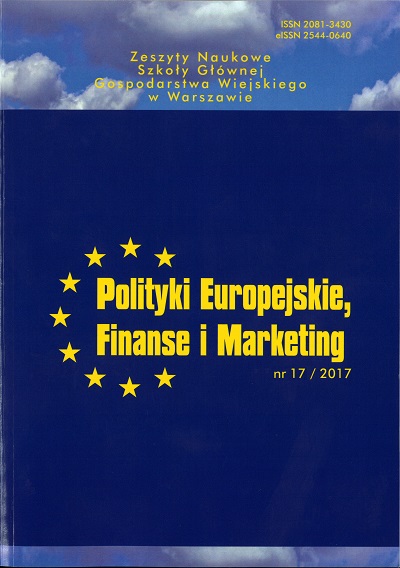Main Article Content
Article Details
Becker Ch.: The human actor in ecological economics: Philosophical approach and research perspectives, Ecological Economics 60/2006. (Crossref)
Becker Ch.: Sustainability Ethics, 2010, http://ssrn.com/abstract=1626013 [accessed: 1.03.2016]. (Crossref)
Bina O., Guedes Vaz S.: Humans, environment and economies: From vicious relationships to virtuous responsibility, Ecological Economics 72/2011. (Crossref)
Chatzidakis A., Hibbert S., Smith A. P.: Why people don't take their concerns about fair trade to the supermarket: The role of neutralization, Journal of Business Ethics 74/2007. (Crossref)
Daly H.E., Farley J.: Ecological Economics. Principles and Applications, ISLAND PRESS, Washington DC 2004.
Esterlin R. A.: Will Raising the Incomes of all Increase the Happiness of All? Journal of Economic Behavior and Organization 27/1995. (Crossref)
Faber M., Petersen T., Schiller J.: Homo oeconomicus and homo politicus in Ecological.Economics, Ecological Economics 40/2002. (Crossref)
Ferraro E., Reid L.: On sustainability and materiality. Homo faber, a new approach, Ecological Economics 96/2013. (Crossref)
Frankish K., Evans J.: The duality of mind: An historical perspective, [In:] In two minds: Dual processes and beyond, Ed. J. Evans, K. Frankish, OXFORD UNIVERSITY PRESS, New York, 2009. (Crossref)
Frederick S., Kahneman D.: Representativeness revisited: Attribute substitution in intuitive judgment, [In:] Heuristics of Intuitive Judgment: Extensions and Applications, Ed. T. Gilovich, D. Griffin, D. Kahneman, CAMBRIDGE UNIVERSITY PRESS, New York 2002. (Crossref)
Gendron C.: Beyond Environmental and Ecological Economics: Proposal for an Economic Sociology of the Environment, Ecological Economics 105/2014. (Crossref)
Gintis H.: Beyond Homo Economicus: evidence from experimental economics, Ecological Economics 35/2000. (Crossref)
Jager W., Janssen M.A., De Vries H.J.M., De Greef J., Vlek C.A.J.: Behaviour in commons dilemmas: Homo economicus and Homo psychologicus in an ecological-economic model, Ecological Economics 35/2000. (Crossref)
Jones E.: Rationalisation in every-day life, The Journal of Abnormal Psychology vol. 3 no. 3/1908. (Crossref)
Kirman A.: Is it rational to have rational expectations? Mind & Society 13/2014. (Crossref)
Kraciuk J.: Paradygmat homo oeconomicus w aspekcie rozwoju ekonomii heterodoksyjnej, Prace Naukowe Uniwersytetu Ekonomicznego We Wrocławiu. Ekonomia 401/2015. (Crossref)
Meadows D. H., Meadows D. L., Randers J., Behrens W.: The Limits to Growth, UNIVERSE BOOKS, New York 1972.
Menzel S.: Are emotions to blame? - The impact of non-analytical information processing on decisionmaking and implications for fostering sustainability, Ecological Economics 96/2013. (Crossref)
Munda G.: Environmental Economics, Ecological Economics, and the Concept of Sustainable Development, Environmental Values 6/1997. (Crossref)
Muth J. F.: Rational Expectations and the Theory of Price Movements, Econometrica, vol. 29 no. 3/1961. (Crossref)
Nyborg K.: Homo economicus and homo politicus: interpretation and aggregation of environmental values, Journal of Economic Behavior & Organization 42/2000. (Crossref)
Røpke I.: The early history of modern ecological economics, Ecological Economics 50/2004. (Crossref)
Røpke I.: Trends in the Development of Ecological Economics from the Late 1980s to the Early 2000s, Ecological Economics 55/2005. (Crossref)
Schiliro D.: Bounded rationality: Psychology, economics and the financial crises, Theoretical and Practical Research in Economic Fields vol. IV issue 1(7)/2013.
Siebenhüner B.: Homo sustinens - toward a new conception of humans for the science of sustainability, Ecological Economics 32/2000.
Simon H. A.: Theories of bounded rationality, [In:] Decision and Organization, Ed. C. B. McGuire, R. Radner, NORTH HOLLAND PUBLISHING COMPANY 1972.
Smith A.: The Theory of Moral Sentiments, DOVER PUBLICATIONS, INC Mineola, New York 2012,
https://books.google.pl/books?id=2iV_vnHmdUEC&printsec=frontcover&hl=pl#v=onepage&q&f [accssesed: 24.02.2017].
Smith V. L.: Constructivist and Ecological rationality in Economics, The American Economic Review vol. 93 no. 3/2003. (Crossref)
Söderbaum P.: Values, ideology and politics in ecological economics, Ecological Economics 28/1999. (Crossref)
Spash C. L.: Social Ecological Economics: Understanding the Past to See the Future, American Journal of Economics and Sociology vol. 70 no. 2/2011. (Crossref)
Stanovich K. E.: Who is rational? Studies of Individual Differences in Reasoning, PSYCHOLOGY PRESS, ROUTLEGE, TAYLOR&FRANCIS GROUP, New York, London 2011.
Waring T.M.: New Evolutionary Foundations: Theoretical Requirements for a Science of Sustainability, Ecological Economics 69/2010. (Crossref)
Downloads
- Marzanna Witek-Hajduk, Jolanta Mazur, Andrzej Sznajder, Bartosz Targański, Piotr Zaborek, CHARACTERISTICS OF INTERNET DOMAINS OF POLISH EXPORT BRANDS AND SPECIFICS OF A SECTOR , The Scientific Journal European Policies, Finance and Marketing: No. 17(66) (2017)
You may also start an advanced similarity search for this article.

This work is licensed under a Creative Commons Attribution-NonCommercial 4.0 International License.
All articles published in European Policies, Finance and Marketing are fully open access. In this way, the scientific research results contained in articles published in our journal are available to every reader free of charge - in accordance with the CC BY-NC license (https://creativecommons.org/licenses/by-nc/4.0/).
According to the CC BY-NC license you are free to:
- Share — copy and redistribute the material in any medium or format
- Adapt — remix, transform, and build upon the material
The licensor cannot revoke these freedoms as long as you follow the license terms.
Under the following terms:
- Attribution — You must give appropriate credit , provide a link to the license, and indicate if changes were made . You may do so in any reasonable manner, but not in any way that suggests the licensor endorses you or your use.
- NonCommercial — You may not use the material for commercial purposes .
- No additional restrictions — You may not apply legal terms or technological measures that legally restrict others from doing anything the license permits.
Source: https://creativecommons.org/licenses/by-nc/4.0/deed.en
According to that, the authors retain the copyright and full publishing rights.





